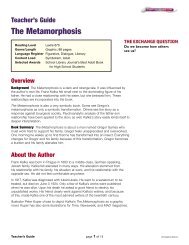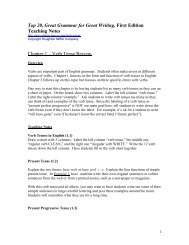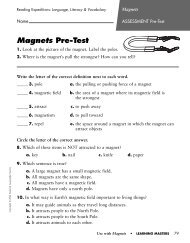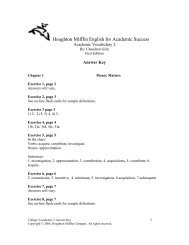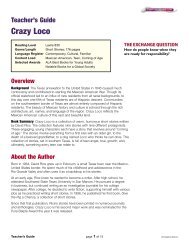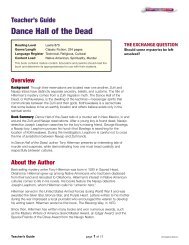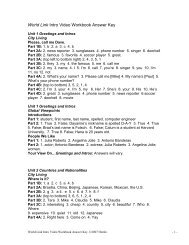English for Cabin Crew Trainer's Guide - Heinle
English for Cabin Crew Trainer's Guide - Heinle
English for Cabin Crew Trainer's Guide - Heinle
Create successful ePaper yourself
Turn your PDF publications into a flip-book with our unique Google optimized e-Paper software.
UNIT<br />
LEAD IN Speaking<br />
8 Complaints and disruptive passengers<br />
Ask, What sort of things do passengers complain about? Elicit a<br />
list to the board (you could compare it to the list in exercise 1).<br />
Ask, What’s the most unusual complaint you have ever had? Who<br />
was the most disruptive passenger you ever met?<br />
Responding to passenger complaints<br />
EXERCISE 1 and 2 Speaking<br />
Ask students to work in pairs or small groups to discuss the list of things<br />
to complain about. In feedback, elicit ideas of what people might say<br />
when complaining about each situation.<br />
Pre-teaching vocabulary<br />
Check the following word: patient (prepared to wait calmly).<br />
EXERCISE 3 and 4 Listening<br />
Ask students to work in pairs to discuss what they would say in each<br />
situation. Get feedback in open class and elicit ideas. Play the recording.<br />
Ask students to listen and see if the fl ight attendants used the same<br />
expressions as they chose. Then ask students to fi ll in the gaps. Let<br />
students check in pairs and play the recording again if necessary. Get<br />
feedback in open class at the end.<br />
Answers<br />
1 apologize; busy; get<br />
2 good; really; away<br />
3 dear; patient; special<br />
EXERCISE 5 Speaking<br />
Study the analysis of what the fl ight attendant says as a class, then ask<br />
students to work in pairs to analyze the other expressions in the same<br />
way. Get feedback in open class and discuss the follow-up questions.<br />
Answers<br />
2 Sympathize: Oh dear, that’s not good.<br />
Apologize: I’m really sorry.<br />
Find a solution: Let me take it away <strong>for</strong> you and see if I can get you a<br />
hot cooked meal immediately.<br />
3 Sympathize: Oh dear.<br />
Apologize: I’m sorry about this.<br />
Find a solution: Let me just check the special meals list.<br />
OFFERING TO HELP (2) Language focus<br />
Give students time to read through the phrases in the box. Alternatively,<br />
read out the phrases and ask students to read and follow. Ask students,<br />
What is the <strong>for</strong>m of the sentence? (See below)<br />
Language notes<br />
Here, Let me ... means allow or permit me to do something. It is a polite<br />
and friendly way of making an offer because it is effectively offering to<br />
do something <strong>for</strong> someone with that person’s permission.<br />
Note the <strong>for</strong>m: Let me + infi nitive without to<br />
33<br />
EXERCISE 6 Pronunciation<br />
Play the recording. Ask students to listen and repeat.<br />
Pronunciation notes<br />
Note the strong stress on Let and the stronger stress on the main verb:<br />
Let me help you.<br />
Pre-teaching vocabulary<br />
Check the following words: disgusting, awful (really bad); frustrating (a<br />
feeling of anger because you have to wait or are stopped from doing or<br />
having something).<br />
EXERCISE 7, 8 and 9 Listening<br />
Play the recording. Ask students to listen and write down the complaints.<br />
Let students check their answers in pairs and discuss possible responses.<br />
Get feedback in open class.<br />
Answers<br />
1 dirty toilets<br />
2 cold cabin<br />
3 long delay and no in<strong>for</strong>mation<br />
4 wrong seats with crying babies nearby<br />
5 no snacks, dirty plane, awful service<br />
Play the recording. Students listen and see if the fl ight attendant’s<br />
response matched their ideas. In feedback, ask students whether they<br />
thought the response was an appropriate one in each case.<br />
Ask students to work in pairs to fi ll in the gaps. Play the recording again<br />
if necessary. You could ask students to practise saying the sentences.<br />
Answers<br />
1 letting; apologize<br />
2 frustrating<br />
3 about<br />
4 sorry; enjoyed<br />
5 so; only<br />
ROUND UP<br />
You could give students practice in responding to complaints by<br />
doing a role play. Ask students to work in groups of three, with a<br />
student A, B and C in each group. A and B are passengers. C is a<br />
fl ight attendant. Ask students to look at the list of situations in<br />
exercise 1. Give A and B a minute to think of complaints to make<br />
about each situation. Ask C to revise phrases from the page that<br />
a fl ight attendant might use.<br />
Ask Cs to stand up. Announce a situation. Say, the food.<br />
The passengers must start complaining about the food and the<br />
fl ight attendant must sympathize, apologize and make offers.<br />
After half a minute, change the situation by saying, the lack<br />
of in<strong>for</strong>mation. Students must change their complaints and<br />
responses. Play out four or fi ve situations.



